Before I start, a digression: is it ‘education technology’ or ‘educational technology’? I’m with the latter, though I haven’t seen much discussion of the question.
Many years ago, I started work at Hong Kong Polytechnic (which more recently added, not substituted, ‘University’ in its name), in the ‘Education Technology Unit’. The title grated, and I queried it with the Director, whose response now escapes me, apart from remembering that I left unsatisfied. The use of both phrases persists, even in Australia where we have both Education Technology Solutions and the Australasian Journal of Educational Technology.
Persisting with educational technology, earlier this year I posted ‘A nice little publication worth a squiz‘, dealing with ‘Innovating Pedagogy 2012’, a report from the UKOU (published by the aptly named Institute of Educational Technology). It occurred to me that there might be a few more useful reports out there, so I did a search for those published this year, and here’s a manageable list of five. The first one uses that less-preferred (erroneous?) term without the ‘-al’:
Education Technology Success Stories
In March this year, the Center for Technology Innovation at Brookings published this report, covering what the authors consider are five success stories: Robot Assisted Language Learning (RALL); Massive Open Online Course (MOOC); Minecraft; Computerized Adaptive Testing (CAT); and Stealth Assessments. In case you’re wondering, Minecraft is a ‘highly successful “sandbox” computer game. It is open ended with no defined narrative or game play objectives.’ As for Stealth Assessments, you’ll have to read it to find out.
Expanding Evidence Approaches for Learning in a Digital World
This is an interesting one from the US Department of Education: Office of Educational Technology. You can get its drift from the stated purpose, ‘to present an expanded view of approaches to evidence. It presents the case for why the transition to digital learning warrants a re-examination of how we think about educational evidence. The report describes approaches to evidence-gathering that capitalize on digital learning data and draws implications for policy, education practice, and R&D funding.’ The chapter headings give you its flavour:
- Making Sure Learning Resources Promote Deeper Learning
- Building Adaptive Learning Systems That Support Personalized Learning
- Combining Data to Create Support Systems More Responsive to Student Needs
- Improving the Content and Process of Assessment with Technology
- Finding Appropriate Learning Resources and Making Informed Choices
NMC Horizon Report: 2013 Higher Education Edition
I’ve previously mentioned the Horizon Reports (Gazing at The Horizon), and they are pretty good, the annual product of the New Media Consortium. To save my precious words, you can read an excellent outline at ‘10 Emerging Educational Technologies & How They Are Being Used Across the Globe‘, which summarises both the K-12 and Higher Education editions. The ‘usual suspects’ are all there: cloud computing, mobile technologies, learning analytics, MOOCs, open content and so on.
Special Reports from the Center for Digital Education
The Center for Digital Education provides quarterly reports on a variety of issues associated with educational technology. Browse the list to see if any are of interest. Recent examples include:
- Big Data, Big Expectations: The Promise and Practicality of Big Data for Education
- Smart Infrastructure
- Funding and Professional Development
- Specialty Classroom Technologies
You need to register (no payment required) to download the reports. Note that they also publish regular articles on associated topics, such as ‘Wireless Connectivity in Education’.
Academic research in education, technology and media: mapping the field
Finally, here’s one from my old university, Monash, by a group of four colleagues from the Faculty of Education. It’s not very long, so give it a go if the topic entices you.
The authors were attempting to answer three questions:
- who is conducting research in the area of education, technology and media;
- what methods (or kinds of methods) of data collection and analysis are privileged in this research; and
- what is the use of theory in shaping the kind of research work that gets done?
Note that the first question focusses on the type of work in which the researchers are engaged, not their demographics or geographical location. Highlights (lowlights?) of the findings include the conclusion that many researchers prefer basic forms of descriptive research, and that respondents demonstrated a lack of engagement with theory.
photo credit: post-apocalyptic research institute via photopin cc
photo credit: Buster Benson via photopin cc


